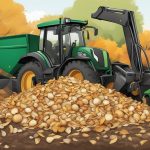To know when compost is ready, you should know that mature compost exhibits a dark brown color, similar to typical topsoil, and has a crumbly texture. It emits an earthy odor, distinguishing it from the smell of decaying vegetables. The volume of mature compost is notably reduced, approximately halved compared to the original materials.
At this stage, the organic materials are no longer visibly distinguishable in the compost, indicating a high level of decomposition. The temperature is cold, indicating that it is no longer actively generating heat, as seen in the earlier stages of composting. This mature compost is ready for use in enriching soil and supporting plant growth.
What Are The Pure Signs Of Compost Maturity?
Compost maturity can be determined by its character and recognizable materials. When these signs are present, you’ll know your Speeding compost is ready for use in your garden.
| Signs | Description |
|---|---|
| Color | Dark brown, resembling regular soil |
| Texture | Crumbly |
| Smell | Earthy, not reminiscent of rotting vegetables |
| Volume | Reduced by about half |
| Organic Materials | No longer visible in the compost |
| Temperature | Cold, with minimal heat generation |
Visual Indicators Of A Mature Compost Pile
Visually inspecting your compost pile can give you valuable insight into its maturity. Mature compost should have a dark, crumbly texture similar to rich soil.
It should not contain any visible traces of the original materials used for composting, such as twigs or food scraps. Instead, you should see a uniform and fine texture that resembles soil structure.
Another visual indicator is the presence of earthworms. These little creatures thrive in mature compost as it provides them with a nourishing environment.
If you spot a healthy population of earthworms in your compost pile, it’s a good sign that the compost is mature and ready to be used.

Temperature And Odor Clues For Compost Readiness
The temperature and odor of your compost pile can also provide valuable clues regarding its maturity. A mature compost pile will have cooled down significantly from its initial hot phase. You can use a compost thermometer to measure the temperature.
When the temperature remains consistently around ambient temperature, it indicates that the composting process is complete.
Furthermore, a mature compost pile should have a pleasant, earthy smell. Any foul or ammonia-like odors may indicate that the compost is not yet fully matured or has not properly decomposed.
If your compost pile smells fresh and earthy, it is a good indication that the organic matter has broken down completely.
Testing Compost For Completeness Using The Bag Test
The bag test is a simple and effective method to check the completeness of compost.
Take a small sample of your compost and place it in a sealable plastic bag. Allow the bag to sit undisturbed for a few days.
If there is condensation or moisture buildup inside the bag, it suggests that the compost is still actively decomposing and not yet ready.
On the other hand, if the sample remains dry, it indicates that the composting process is complete, and it is safe to use the compost in your garden.
N.B: Composting is a natural process, and the time it takes for compost to mature can vary depending on various factors such as the materials used, the size of the compost pile, and environmental conditions.
How To Achieve Optimum Compost Quality?
Several factors influence the quality of the finished compost. Understanding these factors can help you create compost that is rich in nutrients and effective in improving the health of your soil.
Carbon-to-Nitrogen Ratios: Achieving the right balance between carbon-rich materials (also known as “browns”) and nitrogen-rich materials (also known as “greens”) is crucial. The ideal ratio for composting is generally considered to be 30 parts carbon to 1 part nitrogen. This balance facilitates the decomposition process and ensures that beneficial microorganisms thrive, resulting in high-quality compost.
Aeration: Proper aeration is essential for the decomposition of organic matter. Oxygen allows aerobic microorganisms to break down the materials effectively. Insufficient aeration can lead to anaerobic conditions, resulting in foul odors and slow decomposition. Turning the compost heap regularly and incorporating bulky materials can help improve airflow and promote aerobic decomposition.
Moisture: Maintaining the right moisture level in your compost pile is crucial. Too much moisture can lead to a slimy, smelly pile, while too little can slow down decomposition. It is recommended to keep the compost pile moist, similar to a wrung-out sponge. Regularly check the moisture content and adjust as needed by adding water or dry materials.
Particle Size: The size of the organic materials you add to your compost pile can affect the decomposition process. Finely shredded materials decompose more quickly compared to larger chunks. It is advisable to chop or shred materials to increase the surface area for microbial activity and accelerate decomposition.
Temperature: Composting is a biological process that generates heat. Monitoring the temperature of your compost pile is crucial as it indicates the activity of microorganisms. The ideal temperature range for composting is between 120°F and 160°F (49°C and 71°C). This temperature range kills weed seeds and pathogens while promoting efficient decomposition. Regularly monitoring the temperature and adjusting the pile’s structure can help maintain optimum conditions.

How To Address Common Issues And Solve It?
While composting is a relatively straightforward process, certain issues may arise. Here are solutions to common problems you may encounter:
Persistent Odors:
Foul odors emanating from your compost pile may indicate anaerobic conditions or excessive moisture. To address this, turn the pile more frequently to increase aeration and add dry materials like straw or shredded newspaper to absorb excess moisture. Additionally, ensure that you are not adding items that should not be composted, such as meat, dairy products, or oils.
Slow Decomposition:
If your compost is decomposing at a slower rate, it may indicate imbalances in carbon and nitrogen ratios, lack of aeration, or lack of moisture. Adjust the carbon-to-nitrogen ratio by adding more “green” or “brown” materials as needed. Turning the pile more frequently can help introduce oxygen and promote decomposition. Assess the moisture content and adjust accordingly by adding water or dry materials.
Frequently Asked Questions
When Is Compost Ready To Use?
Compost is ready to use when it looks dark brown, has a crumbly texture, and has a sweet earthy smell. It should no longer resemble the original organic material used to create it.
How Long Does It Take For Compost To Be Ready?
The time it takes for compost to be ready can vary depending on factors such as the type of materials used, the size of the compost pile, and environmental conditions. Generally, it can take anywhere from a few months to a year for compost to be fully ready.
Can You Use Unfinished Compost?
While unfinished compost can still be used in your garden, it may contain partially broken-down materials that can compete with your plants for nutrients. It’s recommended to wait until the compost is fully finished for optimal results.
Conclusion
Determining when compost is ready is essential for successful gardening. By following the indicators discussed in this post, such as a dark and crumbly texture, a sweet and earthy smell, and the absence of recognizable materials, you can ensure that your compost is fully decomposed and ready to use.
Please regularly turn your pile and provide the necessary moisture to speed up the process. With patience and proper care, you’ll have rich, nutrient-rich compost to enhance your garden’s health and fertility. So, start composting today and enjoy the benefits of this natural, sustainable resource.

I am a graduate of Bangladesh Agricultural University, where I delved into various agricultural disciplines, equipping me with a profound understanding of agriculture. Beyond academics, I have hands-on experience in gardening and crop cultivation. My passion is to embrace sustainable farming and horticulture. With a BSc in Agriculture, I am dedicated to promoting environmentally conscious and efficient agrarian practices.
Bachelor of Science (BSc) in Agriculture (Hons.)
Master of Science. (Sustainable Agriculture & Food Security ) (MS)
Bangladesh Agricultural University




